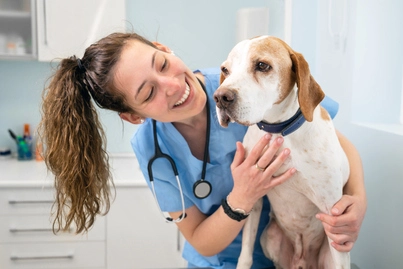Your dog laid down on his or her bed, and when they stood back up, you found a wet spot.
Sound familiar?
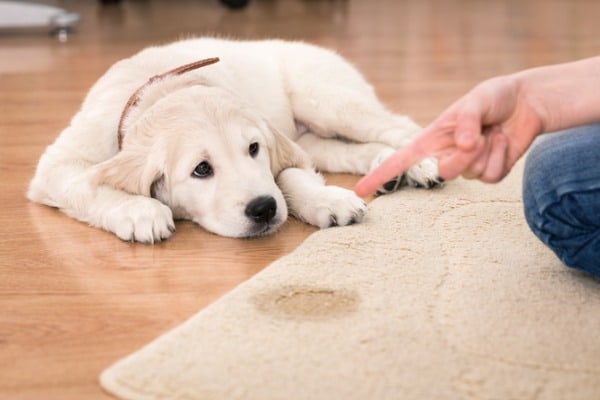
Incontinence can affect dogs in the same way it can people, and sometimes for similar reasons.
Other possibilities? It can be an entirely different problem depending on the dog. Nonetheless, it is something you want to address.
If your dog pees while lying down, it’s messy. It can also indicate a health or behavioral issue that you’ll want to solve sooner rather than later.
So if you find yourself having to clean up puddles or cleaning spots of urine from your carpets, hardwood floors, or bamboo flooring, when your dog is already housetrained, there are a few things you should consider while getting to the root of the issue.
It might mean a trip to the vet, but in some cases, it could be a psychological issue.
Connect with a verified veterinarian in minutes. No waiting for appointments or office hours. No high fees. Your pet's health made convenient and worry-free.
We’ll get to that in a bit.
Either way, there are some things you can do as a pet parent to help solve this problem.
Why Do Dogs Become Incontinent?
Elderly Dogs
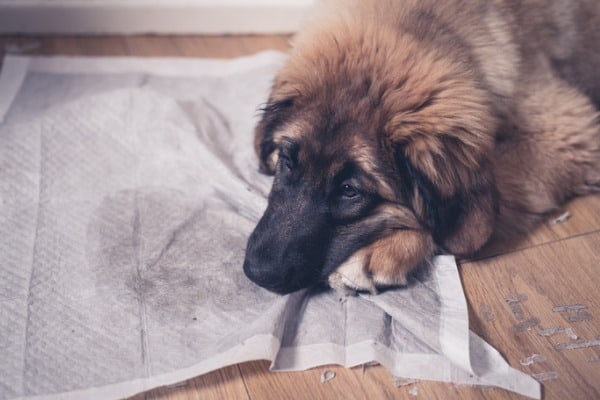
It can happen to dogs of all ages, but this is something more commonly seen in older canines. It’s just one of the signs of aging.
The muscles that control the bladder can become weaker in older age.
Larger dogs can be considered geriatric when they reach 7-8 years old, while smaller breeds aren’t in that phase of life until they reach ten years or more.
Take into consideration your dog’s breed and size before you chalk up their incontinence to old age.
This frees you up to investigate other natural causes you might not normally think of.
Also, take note that several diseases that cause leaking urine are more likely to show up in older dogs.
There’s a Disease or Condition That Needs to be Diagnosed
Some diseases include dribbling urine as a symptom.
It could indicate kidney disease, bladder stones or infection, and Cushing’s disease.
Tumors or cancer might also be screened for if your vet suspects incontinence is a symptom of something serious.
Leaking urine is just one symptom of many your dog might experience if they have any of these conditions.
For example, if blood is present in the urine or if your dog shows signs of distress while trying to eliminate it, it could indicate a bladder infection or stones.
They could also be drinking more water or having full-on accidents – not just dribbling urine.
You might even notice your dog peed in her sleep.
Hormonal Issues
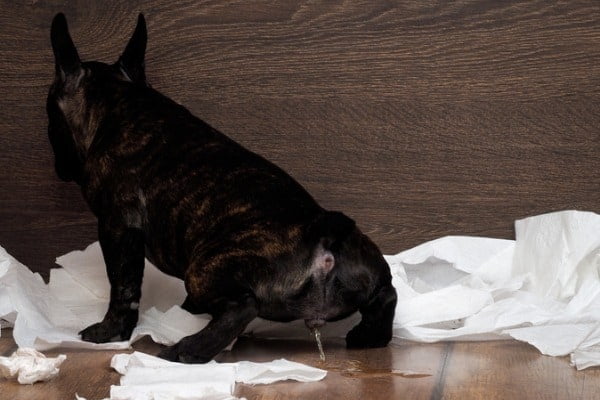
Dribbling urine in a spayed female dog could signal a hormonal imbalance.
This causes a weakened bladder, known as spay incontinence.
This is one of the few reasons some vets will recommend putting off spaying until your female dog is a little bit older.
Spaying too soon can increase the risks of the female dog developing spay incontinence down the road.
While we’re all for spaying and neutering dogs, it’s important to speak with your vet about possible side effects.
They can help you weigh the pros and cons of putting off the procedure until your dog is a little bit older.
If they don’t have an opinion or feel age doesn’t matter, then ask another vet for more professional input.
Young Puppies
Puppies are not well known for their bladder control – and that’s normal.
Puppies can’t hold their urine for long periods, something all new puppy parents are well aware of.
In puppies, you’re more likely to see them have an actual accident rather than leak urine.
They can still dribble when they’re excited, scared, or having trouble holding it until they’ve been let outside.
Now, if your dog won’t pee outside, get that resolved and assess the problem afterward.
In puppies, incontinence is a concern when they show distress when urinating, have bloody or smelly urine, or cannot seem to hold themselves even if they just peed.
A puppy peeing while lying down could simply be overexcited, but it’s important to keep an eye out for other symptoms.
Otherwise, puppy pee is, well, a fact of life.
It will take some time for them to understand they’re supposed to hold it all in until they’ve been let outdoors.
Nervous and Frightened Dogs
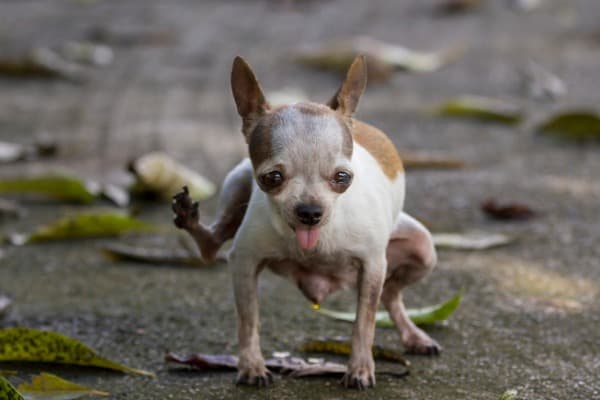
Leaking urine can be your dog’s way of displaying submissive behavior.
It’s more often seen in dogs who have been abused or trained to fear.
Some dogs are just nervous by nature and more prone to urinating to show they’re submitting.
They might do it if they’re feeling unsafe or they’re about to be scolded or punished.
Sometimes, they will do it to submit to another dog in the household.
Puppies frequently display this behavior but grow out of it as long as they’re brought up in a caring environment.
It can be quite frustrating and messy – especially since they often will roll onto their backs and pee on themselves.
This usually means a bath is in order, as it’s inevitable your dog will smell like urine.
It’s important to stay calm, or you could exacerbate the issue.
A dog who is in constant fear of being punished will be difficult to train out of this behavior.
Finding the Cause

An otherwise healthy dog can be leaking urine for several reasons.
It could be a disease we mentioned earlier, or it could be a psychological issue.
Since leaking urine can be among the first sign that something isn’t right with your dog’s health, you should make a call to your vet about the next steps.
If your dog is already at risk for bladder issues, you might be in for a trip to the vet as soon as possible.
Other signals, such as darker dog urine or finding mucus in their urine should not be disregarded either.
Some dog breeds are more prone to developing bladder stones.
Additionally, your vet will likely recommend that you bring your dog in right away if they appear to be in pain or have blood in their urine.
Since bladder stones and canine urine crystals should be treated swiftly, your vet will use several diagnostic tools to either confirm or rule these out as the reason for your dog’s incontinence.
They will do a urinalysis and might need to perform an X-ray or ultrasound.
This procedure can also be used to look for signs of infection.
If the culprit isn’t an infection or bladder stones or crystals, your vet could recommend additional screening to rule out certain cancers or kidney disease.
A special diet or urinary care dog food can also be a no-brainer when it comes to basic treatment.
What if there isn’t a clear cause?
In this case, something in your environment could be triggering anxiety, which in turn can cause bladder leakage.
At that point, you will be able to do more for your dog than your vet can.
Adjusting their living situation is something you’ll need to consider.
How to Treat Incontinence in Dogs
Treatment, of course, depends on the cause.
In some cases, your dog might need surgery or medication to get rid of the source of the issue.
Elderly Dogs
While some issues that cause incontinence in older dogs can be treated, it can also be a part of the aging process.
In short, dogs might leak urine simply because they’re quite old.
Surgery or intensive treatments in older dogs might not be the best option for overall quality of life.
So if your dog has reached a ripe old age, investing in diapers for dogs could be the best choice for everyone involved.
If you opt for this, it’s ok! It can truly be best for your dog. Just take care of them as diapers come with risk of urine scald if not monitored properly.
Bladder Stones
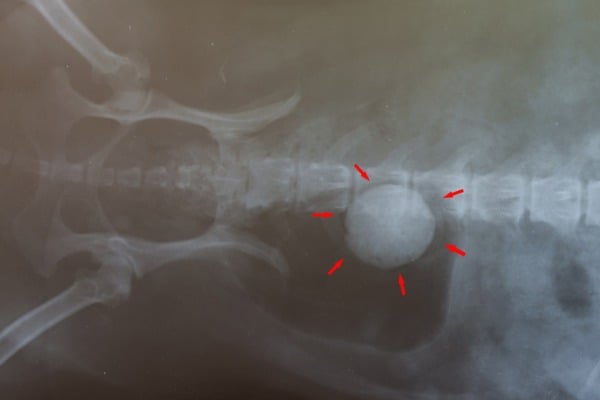
To put an end to the pee, your vet will need to get rid of the bladder stones.
Sometimes, they’re small enough that they can pass on their own with the help of fluid therapies.
An imbalance in pH is frequently the cause of bladder crystals or stones, so adjusting your dog’s diet will be necessary to keep the issue from recurring.
If the stones are too large to pass, your dog might need minor surgery to remove them.
Pain medications and antibiotics might also be prescribed, especially if the bladder stones accompany an infection.
Cushing’s Disease
In dogs, this disease can be brought on by a tumor on the adrenal gland.
This tumor must be removed before any medications will be helpful in managing the condition.
There are a variety of medications that are useful for dogs who have been diagnosed with Cushing’s disease.
The cause and severity will help your vet determine which one is best for your dog.
The good news?
Once this disease is being treated, many of the symptoms, including incontinence, should begin to disappear.
Spay Incontinence
Your vet may determine your female dog’s incontinence is due to hormonal imbalances.
In this instance, estrogen therapy has proven to be highly effective.
In extreme cases, the issue might be corrected with surgery or collagen injections designed to fortify the urethral muscles.
Behavioral Causes
You might be dealing with a rescue dog with an unknown background; they could have been abused or mishandled in the past, causing them to be extra nervous.
Or, you might have a dog who is just a nervous Nellie.
Another related symptom to this is if say, your dog peed on your bed in front of you. Yes, this happens and is not that uncommon. You may even have to get dog pee out of your mattress!
Go Easy…
In either case, a gentle hand is the most important tool in rehabilitating them.
Dogs who are urinating as an act of submission will probably display other submissive behaviors.
These include rolling onto their backs, flattening their ears, tucking their tails, or showing their teeth in a “grin” while squinting their eyes.
They could display these behaviors as a response to certain people, noises that irritate them, or chaotic situations.
Dogs who have been scolded or hit when they have an accident will be more likely to get worse when urinating.
Yelling or punishing them for any unwanted actions runs the risk that they’ll pee when they feel they’re in trouble.
Rather than scold them for anything, including bladder leakage, calmly take them outdoors. Reward them if they do their business outside.
What if you catch them chewing shoes or raiding the trash?
It is, of course, acceptable to put a stop to this behavior. Instead of shouting, try starting with a firm “no” and remove them from the room.
A quick time-out can be helpful.
Since dogs are social and like being with their families, shutting them away from the rest of the household for a few minutes can be enough to get the message across.
It’s important to note that these strategies are only effective if you catch them in the act or very shortly after.
If you come home to a ruined pee stained couch or a raided cupboard, you can’t know how recently the offense took place.
It might seem like the thing to do to shame them, but it can cause them anxiety. It can also make them fearful of you.
Be Proactive
Prevention is the key to unwanted behaviors.
If your dog can’t be trusted alone with the house just yet, crate training is a good avenue to explore.
The less opportunity your dog has to do something unacceptable, the less you will need to curb them.
Redirect unwanted behavior with something good – a toy, a walk, a game of fetch.
Dogs that are constantly being yelled at are likely to develop submissive behaviors.
What about puppies?
Hopefully, when you adopted your puppy, you made peace with the fact that pee would be something you’d have to deal with eventually.
Puppies in training literally can’t help having accidents sometimes.
Even the most vigilant of pet parents can slip up and not get their pup outside in time for them to relieve themselves.
So rather than shame your puppy for their accident, double down on house training.
Take them to potty before and after meals, and try to keep them on a consistent schedule.
This means waking up in the middle of the night for a bathroom break – puppies typically can’t hold their bladders overnight until they’re 16 weeks old.
Some puppies are 6-8 months before they can sleep the night through without needing to pee.
Did we mention praise?
Even if they’re young puppies are highly receptive to being rewarded and praised for good behavior.
Make sure every successful bathroom break ends with as much praise as you can provide – and even a small treat.
Put an End to Wet Blankets
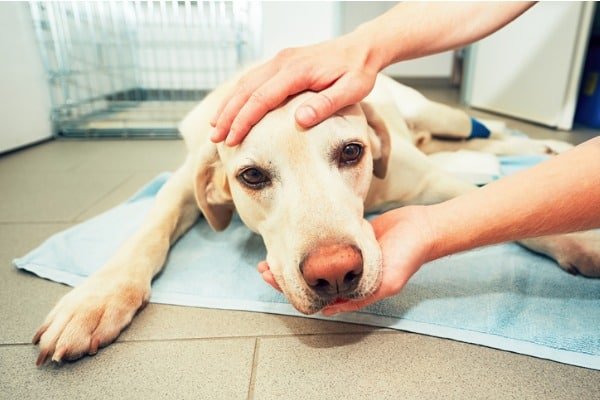
Dogs who have incontinence issues often pee in their sleep, and you notice your dog pees while they’re lying down.
Their lack of bladder control can be attributed to several issues – some medical and some psychological.
Bladder leakage can indicate a more serious issue, so having your vet check things out is the best place to start.
If it’s not a medical issue, you might need to commit more time to your dog’s training or rehabilitation. This is especially true for rescued dogs.
In the meantime, be sure to have a good dog urine remover on hand, as you may need it!
Remember – most of these problems have answers, whether they come from your vet or come from you giving your dog a little more patience.

